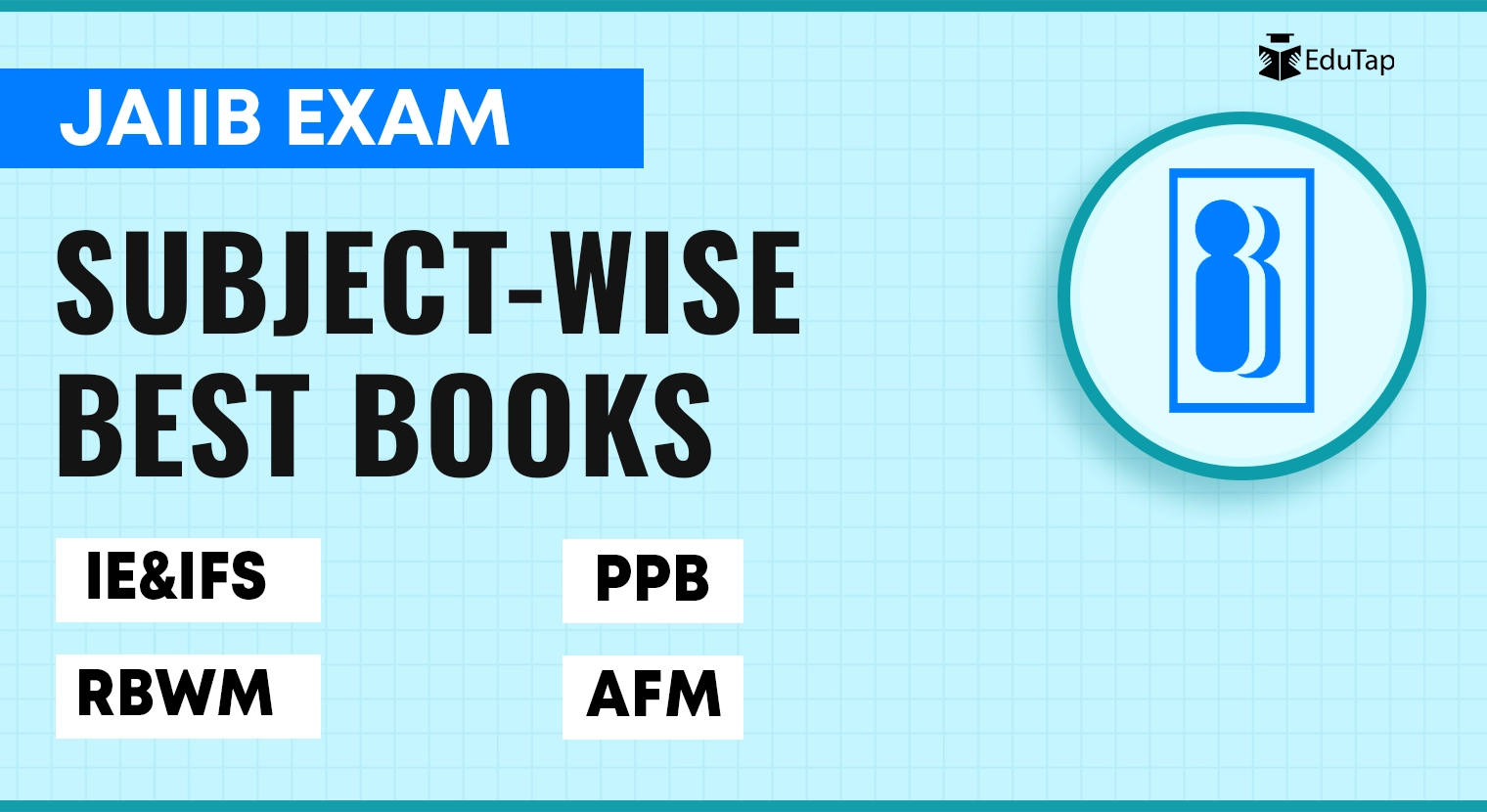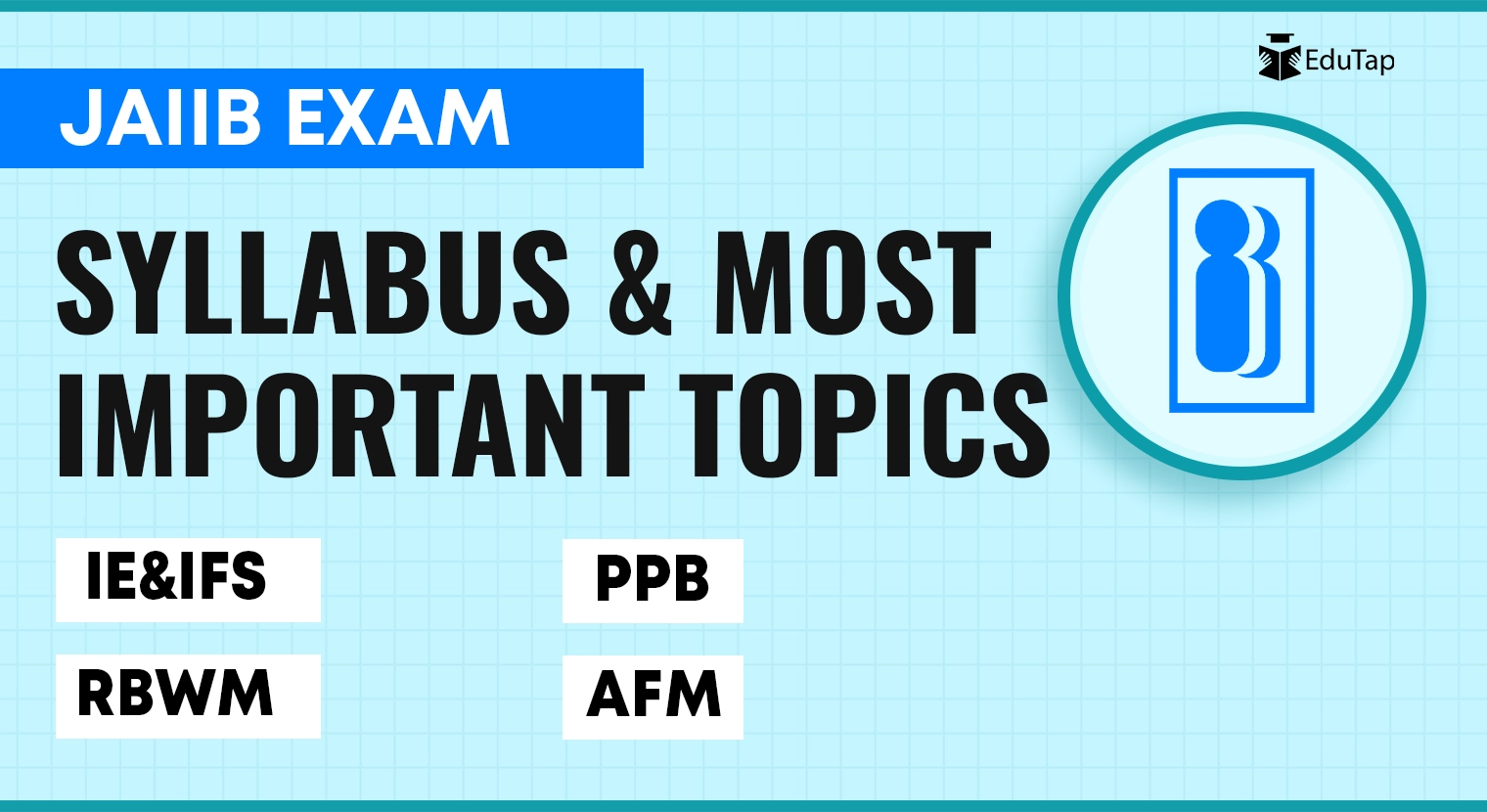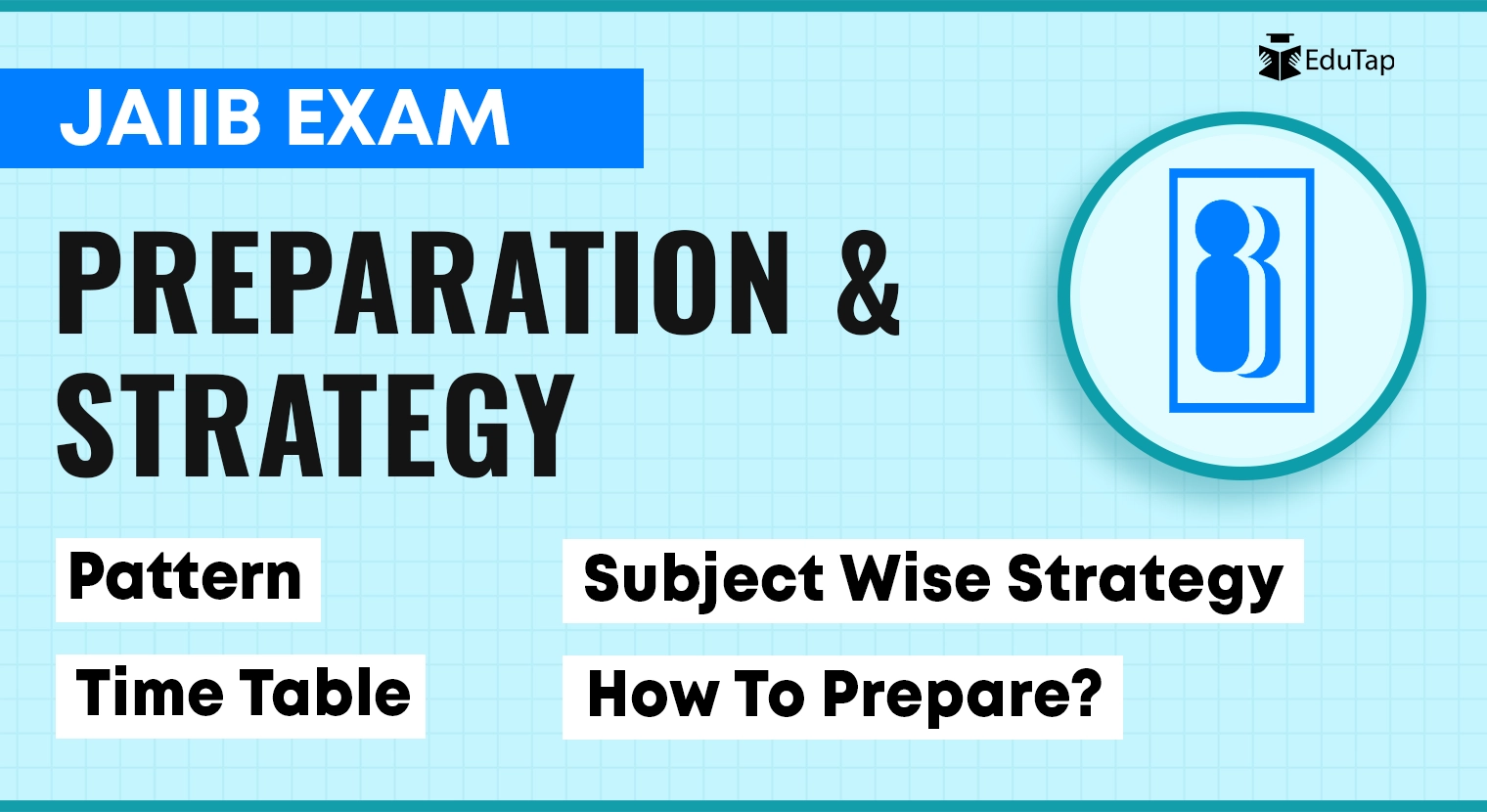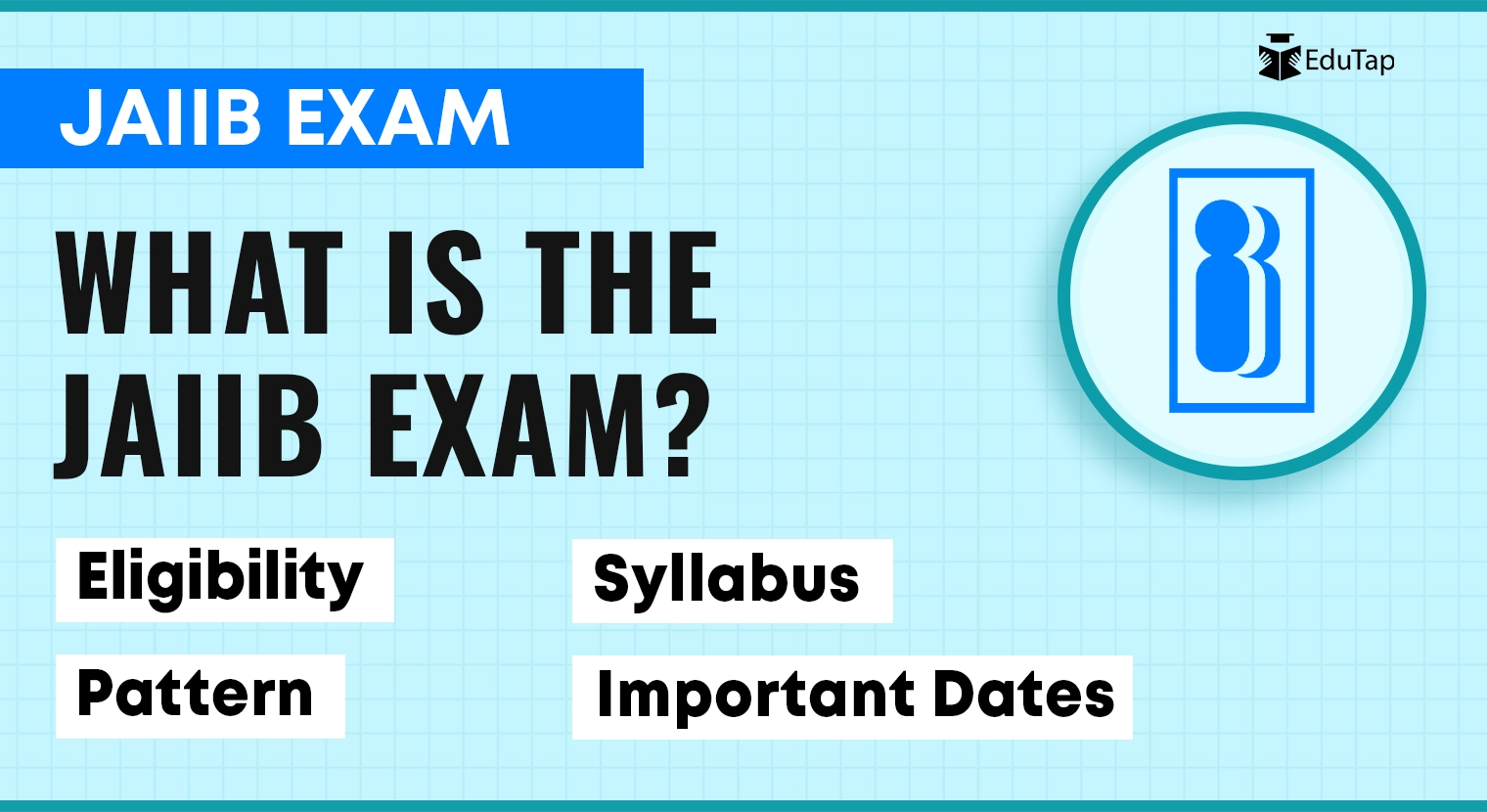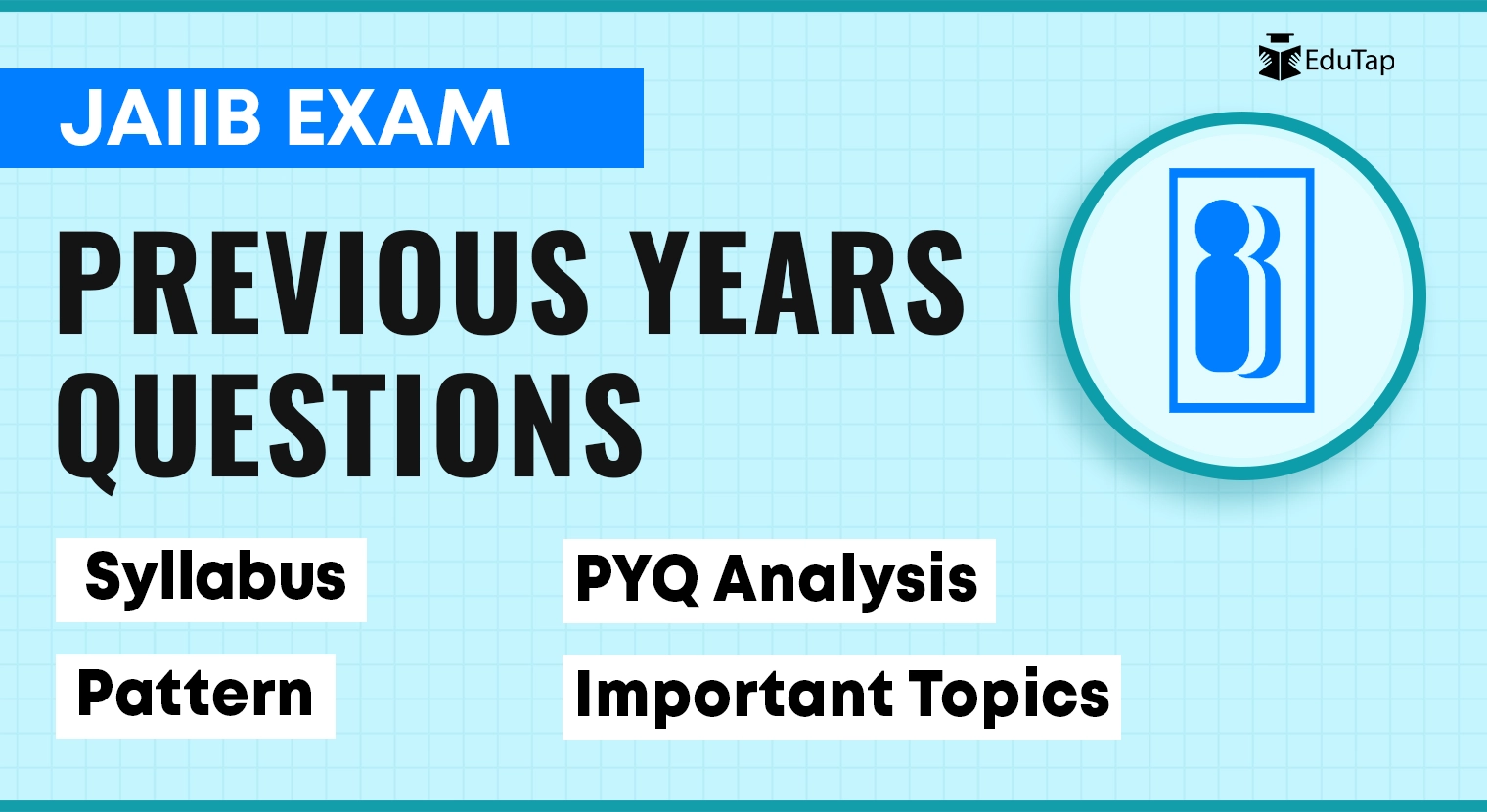The JAIIB exam books are helpful resources for aspirants looking to qualify the exam conducted by IIBF (Indian Institute of Banking and Finance). Choosing the right books for each JAIIB subject—IE&IFS, PPB, AFM, & RBWM—can help you tailor your preparation strategy to perform well in the exam.
In this article, we’ve meticulously curated a list of books and other sources categorised by subjects. We aim to provide you with the most effective and resourceful reading materials to crack the JAIIB exam.
JAIIB Exam Subjects
The JAIIB exam consists of four subjects:
- Indian Economy and Indian Financial System (IE&IFS)
- Principles and Practices of Banking (PPB)
- Accounting & Financial Management for Bankers (AFM)
- Retail Banking and Wealth Management (RBWM)
Each subject is further divided into 4 modules—A, B, C, and D.

Best Books and Sources for IE&IFS Preparation
The JAIIB Paper 1 (IF&IFS) consists of four modules:
- Module A: Indian Economic Architecture
- Module B: Economic Concept Related to Banking
- Module C: Indian Financial Architecture
- Module D: Financial Products and Services
1. NCERT Economy Books for Class XI & XII (Modules A & B)
Book Highlights:
- These books provide a foundational understanding of economic concepts and principles.
- The books have exercises and problems that enhance critical thinking and problem-solving skills.
Please note that these books are just to improve your basic knowledge and are not compulsory if you are already familiar with the basics of the Indian economy.
2. Indian Economy & Indian Financial System by Macmillan (Module A, B, C, and D)
Book Highlights:
- This book covers essential aspects of the Indian economy and financial system and helps you understand the structure, composition, and functioning of the Indian economy.
- It overviews India’s economic policies, planning, and reforms.
- It covers critical micro and macroeconomics concepts.
- It includes an in-depth analysis of the Indian financial system, including banking, financial markets, and non-banking financial institutions.
- It is a reliable source from which most IE&IFS questions are derived.
- This book enriches your learning experience with multiple valuable practice questions, reinforcing your understanding of the material through practical application.
| Best Books and Sources for IE&IFS Preparation | ||||
| SNo. | Books | Author | Publisher | Buy Here |
| 1 | NCERT Economy Books for Class XI & XII | NCERT | NCERT | Buy Online |
| 2 | Indian Economy & Indian Financial System | IIBF | Macmillan | Buy Online |
Other Recommended Sources
- Free Videos: YouTube Videos
- Telegram Channel: EduTap Telegram Channel
- Other Materials: IIBF e-Learning
Are Books Sufficient to Qualify IE & IFS Paper?
The Indian Economy & Indian Financial System book by Macmillan is sufficient to prepare for IE and IFS paper. The questions from the previous paper came from this book only, so if you understand topics from this book, you are set for the paper.
However, this book is quite bulky, and the information within is conveyed using complex language, making it challenging to comprehend and complete within a limited time. Hence, it is essential to also follow the other recommended sources (mentioned above) to save time.
Now that you have understood the important books and other resources for IE&IFS, let’s take a look at the important topics you must cover to qualify the paper.
Most Important Topics for the IE&IFS
We have analysed the number of questions asked in the previous paper from each module of IE&IFS to identify the most important topics. Here are the most important topics for the JAIIB IE&IFS paper.
1. Module A: Indian Economic Architecture
| Module A: Indian Economic Architecture | ||
| SNo. | Chapters | Topics |
| 1 | An Overview of the Indian Economy | Basic Characteristics of Indian Economy – World Bank Classification Economy till 2008 & after 2008 – Hindu Rate & Growth |
| 2 | Sectors of the Indian Economy | Role & Importance of Primary, Secondary & Tertiary Sector Sunrise Sector of Indian Economy |
| 3 | Economic Planning in India and NITI Aayog | Five Years Plans in India NITI Aayog – Strategy for New India @ 75 |
| 4 | Role of Priority Sector and MSME in the Indian Economy | List of Priority Sectors Identified in India & PSL Targets |
| 5 | Infrastructure including Social Infrastructure | Energy Power, Transport system viz., Rail, Road, Civil Aviation – Initiative given |
| 6 | Economic Reforms | Economic Transformation – Financial Sector – Narasimham Committee |
| 7 | Foreign Trade Policy, Foreign Investments, and Economic Development | FDIs, FIIS, and Recent Trends |
| 8 | Climate Change, Sustainable Development Goals (SDGs) | India’s progress in SDGs, including Climate change, CSR Activities – Initiatives, CoP 26, CSR |
2. Module B: Economic Concept Related to Banking
| Module B: Economic Concepts Related to Banking | ||
| SNo. | Chapters | Topics |
| 1 | Fundamentals of Economics, Microeconomics, Macroeconomics, and Types of Economies | Economics – An Introduction – The Three Definitions |
| 2 | Supply and Demand | Forces Behind the Demand Curve |
| 3 | Money Supply and Inflation | Money Supply – Measures, Money Multiplier, Velocity, Characteristics of Currency Measures of Inflation – CPI, WPI, GDP Deflator |
| 4 | Theories of Interest | Keynes’ Liquidity Preference Theory of Rate of Interest Effect of Fiscal and Monetary |
| 5 | Business Cycles | Characteristics of a Business Cycle |
| 6 | Monetary Policy and Fiscal Policy | GDP and Related Concepts Utility |
| 7 | National Income and GDP Concepts | FDIs, FIIS, and Recent Trends |
| 8 | Union Budget | Expenditure & Receipts |
3. Module C: Indian Financial Architecture
| Module C: Indian Financial Architecture | ||
| SNo. | Chapters | Topics |
| 1 | Indian Financial System – An overview | Phase I & II: Bank Nationalisation |
| 2 | Indian Banking Structure | Types of Banks |
| 3 | Banking Regulation Act, 1949 and RBI Act, 1934 | RBI Act, 1934 – Paid-up Capital and Board of Directors Banking Regulation Act, 1949 |
| 4 | Development Financial Institutions | Evolution of DFIs National Bank for Financing Infrastructure and Development (NaBFID) |
| 5 | Micro Finance Institutions | Evolution of Microfinance in India and PSL norms SHG-Bank Linkage |
| 6 | Non-Banking Financial Companies | NBFS Definition and types |
| 7 | Insurance Companies | Privatisation and Foreign Direct Investment (FDI) in Insurance Sector |
| 8 | Reforms & Developments in the Banking Sector | Bad Bank |
4. Module D: Financial Products and Services
| Module D: Financial Products and Services | ||
| SNo. | Chapters | Topics |
| 1 | Overview of Financial Markets | Price Discovery |
| 2 | Money Markets and Capital Markets | Notice Money and Term Money Repo, LTRO, TLTRO |
| 3 | Fixed Income Markets – Debt/Bond Markets | Bond Valuation and Theorems Derivatives Association of India RBI Retail Direct Scheme (RDS) |
| 4 | Forex Markets | Foreign Exchange Management Act (FEA), 1999 |
| 5 | Interconnection of various markets/Market Dynamics | Asian Clearing Union |
| 6 | Merchant Banking Services | Definition and SEBI Regulations |
| 7 | Factoring, Forfaiting & TreDS | Definition & Types |
| 8 | Venture Capital | Concept of Venture Capital, Stages & Exit routes |
| 9 | Leasing and Hire Purchase | Definition, Types, and Parties Involved |
| 10 | Credit Rating Agencies & their Functions | Credit Rating Agency (CRAs) – Definition & History |
| 11 | Insurance Products & Ch43. Pension Funds (include APY, NPS) | Government Products – Insurance (PMJJBY, PMSBY) & Pension (APT, PPF, NPS) |
| 12 | Real Estate Investment Funds/ Infrastructure Investment Fund | REITs & InvITs – Definition & Types |
Important Note:
You can find all these above-mentioned important topics in Macmillan’s Indian Economy & Indian Financial System book.

Best Books and Sources for PPB Preparation
The JAIIB Paper 2 (PPB) consists of four modules:
- Module A: General Banking Operations
- Module B: Functions of Banks
- Module C: Banking Technology
- Module D: Ethics in Bank and Financial Institutions
The module-wise booklist for Paper 2 is given below:
1. Principles & Practices of Banking by Macmillan (Modules A, B, C, & D)
Book Highlights:
- This book provides comprehensive insights into the principles, practices, and various aspects of banking.
- It provides detailed insights into day-to-day banking operations, including core banking functions and services.
- This book offers helpful practice questions, helping you solidify your understanding by applying what you’ve learned.
Modules A and B are explained using technical terms without providing any explanation for these terms. So, if your basic knowledge is unclear, you might frequently search for explanations, which can waste time and energy.
| Best Book for PPB Preparation | ||||
| SNo. | Books | Author | Publisher | Buy Here |
| 1 | Principles & Practices of Banking | IIBF | Macmillan | Buy Online |
Other Recommended Sources
- Free Videos: YouTube Videos
- Telegram Channel: EduTap Telegram Channel
- Other Materials: IIBF e-Learning
- RBI Website: RBI Circulars Till Deadline Mentioned in Syllabus
- Bank Websites: HDFC, IDFC, etc. (For understanding definitions)
- Other Websites: PaiseBazar.com, ClearTax.com, etc.
Is PPB Macmillan Book Sufficient to Qualify the Paper?
Similar to the IE&IFS book, Macmillan’s Principles & Practices of Banking book is also enough to prepare for the PPB paper. Some questions in the paper were directly sourced from the book. Hence, you can not miss this book.
However, it’s worth noting that this book is bulky and demands significant time to cover the syllabus thoroughly. Hence, utilizing the additional sources mentioned above is essential to prepare for PPB effectively.
Now that you have understood the important books and other resources for PPB, let’s take a look at the important topics you must cover to clear the paper.
Most Important Topics for Principles and Practices of Banking
We have analysed the topic-wise yearly trend of the number of questions asked from each topic of PPB to identify the most important topics. Here are the most important topics for JAIIB PPB.
1. Module A: General Banking Operations
| Module A: General Banking Operations | ||
| SNo. | Chapters | Topics |
| 1 | Banker-Customer Relationship | Banker-Customer Relationship |
| 2 | AML-KYC Guidelines | PMLA, Reporting Obligations |
| 3 | Operational Aspects of KYC | KYC-Individuals |
| 4 | Opening A/C of Various types of Customers | Individuals, KJoint, Illiterate, Blind, Minor, Partnership, LLP |
| 5 | Operational Aspects ofDeposit A/Cs | Operational Instructions in Joint Accounts, Attachment Orders |
| 6 | Operational Aspects of Handling Cash | CTS |
| 7 | Banker’s Special Relationship | Mandate, POA, Lien, Appropriation |
| 8 | Dorex Remittance Facilities for Individuals | LRS, Outward Remittances |
| 9 | Aspects of NRI Business | NRE, NRO, FCNR, SNRR |
| 10 | Foreign Currency A/Cs for Residents | Foreign Currency Denomination A/Cs |
| 11 | Payment and collection of Cheques and other Negotiable Instruments | NIA, Paying & Collecting Bank Duties, Endorsement, Crossing, and Dishonour |
| 12 | Ancillary Services | Demand Draft Locker |
| 13 | Duties & Rights of a Banker and Customer | Termination of BCSBI Codes |
| 14 | Grievance Redressal & RBI Integrated Ombudsman Scheme | Ombudsman Scheme |
| 15 | The Consumer Protection Act, 2019 | Product Liability, Councils, Commissions |
| 16 | Right to Information Act, 2005 | PIOs, Anneals, Public Authority |
2. Module B: Functions of Banks
| Module B: Functions of Banks | ||
| SNo. | Chapters | Topics |
| 1 | Principle of Lending | Types of Borrowers, Credit facilities |
| 2 | Appraisal & Assessment of Credit Facilities | Only Definitions |
| 3 | Operational Aspects of Loan Accounts | Common Loan Products |
| 4 | Types of Collaterals & Their Characteristics | Immovable Property, LTV ratios, nature of charge created |
| 5 | Different modes of Charging Securities | Full Chapter |
| 6 | NPAs/Stressed Assets | Asset classification, SMA, Wilful Defaulters (Table) |
| 7 | Important Laws Relating to Recovery of Dues | Basics of Acts |
| 8 | Contracts of Guarantee | Types of Guarantee |
| 9 | Contract of Indemnity | Full Chapter |
| 10 | Letters of Credit | Types, Documents |
| 11 | Laws Relating to Bill Finance | Classification of Bills |
| 12 | Priority Sector Advances | Targets/Sub-Targets & Categories |
| 13 | Agricultural Finance | KCC, PMFBY, MSP |
| 14 | MSMEs in India | Classification, TreDS, PM savNIDHI |
| 15 | Government Sponsored Scheme | In News |
| 16 | GHGs | Full Chapter |
3. Module C: Banking Technology
| Module C: Banking Technology | ||
| SNo. | Chapters | Topics |
| 1 | Essential of Bank Computerisation | Networking Technology, definitions |
| 2 | ADC-Digital Banking | ATM, Electromagnetics Cards, Net Banking |
| 3 | Data Communication Network and EFT Systems | NEFT, RTGS, SWIFT, Definitions |
| 4 | Digital Payment System – NPCI | Full Chapter |
| 5 | Technology Trends in Banking | AI, Chatbots, Blockchains, Crypto, VR, AR, 5G |
| 6 | Security Considerations | Vising, Smishing, Malware, Phishing |
4. Module D: Ethics in Banking & Financial Institutions
| Module D: Ethics in Banking & Financial Institutions | ||
| SNo. | Chapters | Topics |
| 1 | Ethics, Business Ethics & Banking | Ethics & Value |
| 2 | Ethics at Individual Level | Golden Rule, Ethical Dilemmas |
| 3 | Ethics Dimensions – Employees | Insider Trading, Job discrimination |
| 4 | Work Ethics and the Workplace | Whistleblowing |
Important Note:
You can find all these above-mentioned important topics in Macmillan’s Principles & Practices of Banking book.

Best Books and Sources for AFM Preparation
The JAIIB Paper 3 (AFM) consists of four modules:
- Module A: Accounting Principles and Processes
- Module B: Financial Statement and Core Banking Systems
- Module C: Financial Management
- Module D: Taxation and Fundamental of Costing
The module-wise booklist for Paper 3 is given below:
1. NCERT Class XI – Financial Accounting Part 1 (Modules A & B)
Book Highlights:
- This book covers accounting basics and its role in business.
- It helps you analyse financial statements like the income statement, balance sheet, and cash flow statement.
- It enables you to understand the process of reconciling bank statements, locating errors, and rectifying them.
- All 8 chapters of the book are important.
2. NCERT Class XI – Financial Accounting Part 2 (Modules A & B)
Book Highlights:
- This book also helps you analyse financial statements such as balance sheets and profit and loss accounts.
- It covers preparing and analyzing a cash flow statement using direct and indirect methods.
- It offers characteristics and accounting principles for non-profit organisations.
- 9, 12, and 13 chapters of the book are important.
3. NCERT Class XII – Company Accounts & Analysis of Financial Statements (Modules A & B)
Book Highlights:
- This book explains the concept of a company and its characteristics.
- It provides a detailed understanding of share capital and types of shares.
- It also provides a basic understanding of financial statements: balance sheet, profit and loss account, and cash flow statement.
- It offers a comprehensive study of financial statement analysis and its significance.
- Chapters 1, 3, 4, 5, & 6 are important for AFM.
It’s advisable to read NCERT books to establish a strong foundation in accounting, particularly for students without a commerce background. The use of clear and simple language sets NCERT books apart, making it easier to comprehend accounting concepts. Additionally, these books provide comprehensive definitions of accounting jargon, enhancing your understanding of the subject.
4. Accounting & Financial Management For Bankers by Macmillan (Modules A, B, C, & D)
Book Highlights:
- This book covers various accounting and financial management topics tailored explicitly for banking professionals.
- Its topics include accounting processes, bank reconciliation statements, final accounts of banks, bank transactions, bills of exchange, depreciating accounting, e-banking, etc.
- Chapters 19 to 35 are important.
- This book includes essential practice questions, allowing you to apply what you’ve learned and strengthen your grasp of the topics.
| Best Books and Sources for AFM Preparation | ||||
| SNo. | Books | Author | Publisher | Buy Here |
| 1 | Class XI – Financial Accounting Part 1 | NCERT | NCERT | Buy Online |
| 2 | Class XI – Financial Accounting Part 2 | NCERT | NCERT | Buy Online |
| 3 | Class XII – Company Accounts & Analysis of Financial Statements | NCERT | NCERT | Buy Online |
| 4 | Accounting & Financial Management For Bankers | IIBF | Macmillan | Buy Online |
Other Recommended Sources
- Free Videos: YouTube Videos
- Telegram Channel: EduTap Telegram Channel
- Other Materials: IIBF e-Learning
Are Books Sufficient to Qualify AFM Paper?
Likewise, the PPB book, Accounting & Financial Management For Bankers, uses complex language, which may be challenging for aspirants. The book might overwhelm some readers due to the extensive details and technical terms used, making it less suitable for those seeking a more concise and simplified explanation of concepts.
Aspirants, especially those from non-commerce backgrounds, need topics explained straightforwardly to ensure easy comprehension and digestion of the subject matter. Hence, aspirants are advised to use this book as a standard source along with other above-mentioned study materials.
Now that you have understood the important books and other resources for PPB, let’s take a look at the important topics you must cover to clear the paper.
Most Important Topics for Accounting & Financial Management for Bankers
We have analysed the topic-wise yearly trend of the number of questions asked from each topic of AFM to identify the most important topics. Here are the most important topics for JAIIB AFM.
1. Module A: Accounting Principles and Processes
| Module A: Accounting Principles & Processes | ||
| SNo. | Chapters | Topics |
| 1 | Definition, Scope, and Accounting Standards including IndAS | Accounting Standards |
| 2 | Basic Accountancy Procedures | Concepts of Accountancy |
| 3 | Maintenance of Cash/Subsidiary Books and Ledger | Rules of Debit & Credit |
| 4 | Bank Reconciliation Statement | Bank Reconciliation Statement |
| 5 | Trial Balance, Rectification of Errors and Adjusting & Closing Entries | Types of Errors & Suspense Accounts |
| 6 | Depreciation & its Accounting | Different Methods of Depreciation |
| 7 | Capital & Revenue Expenditure | Examples of Capital & Revenue Expenditure |
| 8 | Bills of Exchange | Important Terms Related to Bills of Exchange |
| 9 | Back Office Functions/Handling Unreconciled Entries in Banks | Reconciliation of Inter Branch/Office Entries |
| 10 | Bank Audit & Inspection | Types of Bank Audits & Their Details |
2. Module B: Financial Statement and Core Banking Systems
| Module B: Financial Statement and Core Banking Systems | ||
| SNo. | Chapters | Topics |
| 1 | Preparation of Final Accounts | Preparation of Balance Sheet and Profit & Loss Account |
| 2 | Company Accounts – I | Definition & Types of Companies |
| 3 | Company Accounts – II | Form of Balance Sheet |
| 4 | Cash Flow & Funds Flow | Components of Cash Flow |
| 5 | Final Accounts of Banking Companies | Preparation of Final Systems & Disclosure Requirements |
| 6 | Core Banking Systems & Accounting in Computerised | Terms, Advantages & Disadvantages of Computerised Accounting |
3. Module C: Financial Management
| Module C: Financial Management | ||
| SNo. | Chapters | Topics |
| 1 | Financial Management – An Overview | Principles, Risk Return Trade-Off, Ethics & Social Responsibility |
| 2 | Ratio Analysis | Different Types of Ratios |
| 3 | Financial Mathematics – Calculation of Interest and Annuities | Calculation of Simple & Compound Interest and Definition of Annuities |
| 4 | Financial Mathematics – Calculation of YTM | Bond Theorems, Bond Price Volatility |
| 5 | Capital Structure & Cost of Capital | Approaches and Weighted Average Cost of Capital |
| 6 | Equipment Leasing/Lease Financing | Types of Leases |
| 7 | Working Capital Management | Working Capital Cycle |
| 8 | Derivatives | Types of Derivatives |
4. Module D: Taxation and Fundamental of Costing
| Module D: Taxation & Fundamentals of Costing | ||
| SNo. | Chapters | Topics |
| 1 | Taxation: Income Tax/TDS/Deferred Tax | TCS, TDS, and Deductions |
| 2 | An Overview of Cost & Management Accounting | Methods & Significance of Cost & Management Accounting |
| 3 | Costing Methods | Applications of Costing Methods |
| 4 | Standard Costing | Applications of Standard Methods |
| 5 | Marginal Costing | Profit Volume Ratio & its Significance |
| 6 | Budget & Budgetary Control | Types of Budget |
Important Note:
You can find all these above-mentioned important topics in Macmillan’s Accounting & Financial Management For Bankers book.
Best Books and Sources for RBWM Preparation
The JAIIB Paper 4 (RBWM) consists of four modules:
- Module A: Regulations and Compliance
- Module B: Legal Aspects of Banking Operations
- Module C: Banking Related Laws
- Module D: Commercials Laws with Reference to Banking Operations
The module-wise booklist for Paper 4 is given below:
1. Retail Banking & Wealth Management by Macmillan (Modules A, B, C, and D)
Book Highlights:
- This book covers various retail banking services and wealth management topics.
- Its topics include retail banking products and services, CRM, risk management, insurance, tax and estate planning, etc.
- It provides an overview of wealth management and regulatory compliance, ethical considerations, and customer-centric wealth management.
- There are practice questions in this book that allow you to evaluate yourself.
| Best Books and Sources for RBWM Preparation | ||||
| SNo. | Books | Author | Publisher | Buy Here |
| 1 | Retail Banking & Wealth Management | IIBF | Macmillan | Buy Online |
Other Recommended Sources
- Free Videos: YouTube Videos
- Telegram Channel: EduTap Telegram Channel
- Other Materials: IIBF e-Learning
- Other Source: Retail Banking: Introduction and Concept of Retail Banking
Is RBWM Macmillan Book Sufficient to Qualify the Paper?
The Retail Banking & Wealth Management book is sufficient for preparing all modules. However, aspirants may find it difficult to read this book directly without prior knowledge of retail banking. The usage of technical terms throughout the book might require some familiarity with banking jargon for effective comprehension.
Therefore, it is recommended to read the Retail Banking book (Mentioned above) before Macmillan’s publication. The Retail Banking book is an excellent source to help you understand the basics of retail banking, making it easy to understand the Macmillan publication.
Now that you have understood the important books and other resources for RBWM, let’s take a look at the important topics you must cover to clear the paper.
Most Important Topics for Retail Banking and Wealth Management
We have analysed the number of questions asked in the previous paper from each module of RBWM to identify the most important topics. Here are the most important topics for the JAIIB RBWM paper.
1. Module A: Retail Banking
| Module A: Retail Banking | ||
| SNo. | Chapters | Topics |
| 1 | Retail Banking: Introduction | Characteristics, advantages, and constraints in Retail Banking |
| 2 | Retail Banking: Role within the Bank Operations | Business Models |
| 3 | Applicability of Retail Banking Concepts and Distinction between Racial and Corporate/Wholesale Banking | Distinction between Retail and Corporate/ Wholesale Banking |
| 4 | Branch Profitability | Categories of Profit, Return on Asset, Return on Equity, Branch Operating Efficiency, Factors affecting profitability |
2. Module B: Retail Products and Recovery
| Module B: Retail Products and Recovery | ||
| SNo. | Chapters | Topics |
| 1 | Customer Requirements | Maslow’s Theory |
| 2 | Product Development Process | Product Life Cycle, Debit or Credit Products, Third Party Products, Product Management |
| 3 | Credit Scoring | Credit Scoring Model, Credit Information Companies in India, Issues in Credit Scoring |
| 4 | Important Retail Liability Products | Types of deposits |
| 5 | Important Retail Asset products | PMAY, Types of Loans |
| 6 | Credit and Debit Cards | Co-Branded Cards |
| 7 | Remittance Products | NEFT, RTGS, ECS, NACH, BBPS, AePS |
| 8 | Digitisation of Retail banking Products | IDRBT, INFINET, SFMS, ISCC, NFS |
| 9 | Role of AI and Technology in Retail Banking Products | Benefits of AI in Retail Banking |
| 10 | Recovery of Retail Loans | SARFAESIAct, DRT, Lok Adalat |
| 11 | Management Information Systems | Role of MIS in Banking Industry |
| 12 | Securitisation | Securitisation of Assets |
3. Module C: Support Services – Marketing of Banking Services/Products
| Module C: Support Services – Marketing of Banking Services/Products | ||
| SNo. | Chapters | Topics |
| 1 | Marketing: An Introduction | Marketing Mix |
| 2 | Delivery Channels in Retail Banking | Channel Experience, Internet Banking |
| 3 | Delivery Models | Direct Selling Agents, Dedicated Marketing Managers |
| 4 | Customer Relationship Management in Retail Banking | Implementation of Process of CRM, Benefits of CRM |
| 5 | Service Standards for Retail banking | BCSBI Customer Grievance Handling |
| 6 | Marketing Information System: A Longitudinal Analysis | Functions of MKIS |
4. Module D: Wealth Management
| Module D: Wealth Management | ||
| SNo. | Chapters | Topics |
| 1 | Importance of Wealth Management | Instruments of Wealth Management |
| 2 | Investment Management | Portfolio Management |
| 3 | Tax Planning | All Topics |
| 4 | Other Financial Services Provided by Banks | All Topics |

Conclusion
Choosing the right book and other study material is critical in ensuring success in the JAIIB exam. The above-mentioned JAIIB books also provide multiple practice questions to enhance your understanding of the banking and financial sector. Remember, a well-rounded strategy that combines thorough reading and regular practice can boost your confidence and help you perform well in the JAIIB exam.
FAQs
While JAIIB books are a good source for your preparation for the JAIIB exam, relying solely on them might not be the most effective strategy. Here’s a detailed explanation of why:
Although JAIIB books provide in-depth knowledge and cover the syllabus comprehensively, these books are bulky and use complex language. This can make it challenging for aspirants to understand and cover these books in a limited time.
Moreover, supplementing your preparation with multiple sources offers diverse perspectives and approaches to topics. Different study materials explain concepts differently, helping you grasp complex topics from multiple angles.
Yes, several websites and platforms offer free study materials, mock tests, and video tutorials to help prepare for the JAIIB exam.
Free Resource for IE&IFS
Free Resource for PPB
Free Resource for AFM
Free Resource for RBWM
Clearing the numerical sections in the JAIIB exam requires a structured approach and focused practice. Here are some specific tips to help you succeed in the numerical sections of the JAIIB exam:
1). Understand the Concepts Thoroughly: Before attempting numerical problems, ensure you clearly understand the underlying concepts, formulas, rules, shortcuts, and tricks related to numerical topics.
2). Practice Regularly: Practice is key to mastering numerical problems. Set aside dedicated time daily to solve numerical questions. Gradually increase the complexity of problems as you become more confident.
3). Analyse Previous Year Questions: Review previous years’ numerical questions to identify recurring patterns and topics that carry more weightage, and learn how to solve them.
4). Work on Time Management: Allocate specific time to each numerical question while practising. The goal is to increase your speed without compromising accuracy.
5). Seek Guidance: If you encounter challenging numerical problems, don’t be afraid to seek guidance from mentors and online forums to clarify your doubts and ensure a clear understanding.
Summarise your notes, focus on key concepts and formulas, and take mock tests to assess your readiness and identify areas for last-minute improvement.
